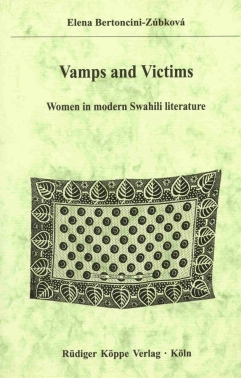


The aim in this anthology in Swahili has been to present various types of novels and short stories by officially acknowledged ‘élite’ writers as well as by authors of the so-called pop-literature even including samples of an erotic novel and of a short story written in slang. The excerpts are taken from both novels and short stories.
The texts in this book are not arranged according to their difficulty, but thematically. They may offer suitable reading for students with various degrees of proficiency, beginning with the works by Kezilahabi in an intermediate course, and finishing with the Zanzibari writers who require a fairly good command of Kiswahili.
The texts have not been normalized. All the excerpts, however, are commented upon, the difficult passages explained and the unusual words listed in the Vocabulary. The division into four parts is only convenient; in fact, most works could appear in more than one section.
For the first section passages have been chosen representing young heroines in a delicate phase of adolescence, in the second grown-up women are shown in the midst of their marital problems; the third section stresses their position as victims, mostly of sexual abuses, whereas the last section features modern, emancipated women. The reader may be surprised because in an anthology on women there are no woman authors. Strange as it may seem to a Western student, there are very few Swahili female writers and moreover, the main concerns of these few are not women’s problems: there is no feminist literature in Swahili, at least not yet. Therefore all the great woman characters in Swahili novels and short stories have been created by men, some of them sincerely concerned with the women’s predicament, displaying a true “feminist approach” as we might say. No female writer has achieved such a profound insight into a young woman’s consciousness as, say, Mohamed S. Mohamed in the novel “Nyota ya Rehema” and in the short story “Kijana yule”, or Said A. Mohamed in the novel “Tata za Asumini”. Vamps or victims? A strict dividing line cannot be made between the vamps and the victims of our title, for the passage from one to the other is often fluid. Popular booklets are full of prostitutes, and even in the ‘high’ or ‘élite’ literature a prostitute is a common character. The difference is that the latter, instead of only heaping blame on these characters, looks for the origin and motives of their miserable lot. The sad predicament of Swahili literary heroines can usually be traced right from their childhood. They have been often seduced or raped as young girls, and this traumatic event leaves its mark on them for their whole life (“Shangwe” from Mpenzi).
Consequently they are expelled from school, chased from home and rejected by their lovers, hence they become prostitutes who then ‘vindicate’ themselves on all men they meet. A model plot is, for instance, “Kitanda cha mauti” by K. Mukajanga who “rewrites” “Rosa Mistika” ten years later. So even the most destructive women (Diana from “Kitanda cha mauti” and Rukia from “Dar es Salaam usiku”) are after all more ‘victims’ than ‘vamps’. If they have not been raped or seduced (or in addition to this abuse), they suffer other wrongs, like Rosa Mistika, Maimuna (“Utengano”) and Asumini (“Tata za Asumini”) who are victims of their fathers’ obsession with sexual purity.
When the woman grows up, there is always a husband, a lover or a superior to whom she must submit (Tegemea in “Kichwamaji”, Bi Tamima in “Utengano”, Mama Tinda in “Gamba la nyoka”, Nunga in “Kikulacho ki nguoni mwako”, Nyalindele and her mother in “Njozi iliyopotea”). Even the emancipated women have to conform to the rules of the society they live in (Lulu in “Kuumeni na kuukeni” and the two women in “Wanawake wawili gengeni”).
Besides Sista-du (from “Check-bob”), perhaps the only ‘pure vamp’ in our anthology, the other nonconformists are Saada (in “Tumba iliyovia”) – a negative character who breaks the traditional norms cutting the roots with her society – and Aziza (in “Mke wangu”) who, on the contrary, opposes her spoilt husband in the name of authentic values of the traditional society.
CONTENTS
I. Childhood and adolescence
E. Kezilahabi: Rosa Mistika
Said A. Mohamed: Tata za Asumini
Mohamed S. Mohamed: Kijana yule; Nyota ya Rehema; Kiu.
II. Marriage and motherhood
E. Kezilahabi: Kichwamaji; Gamba la nyoka
Said A. Mohamed: Utengano
M.S. Abdulla: Mke wangu.
III. Victims of brutality and sexual abuse
Kajubi Mukajanga: Mpenzi, Kitanda cha mauti
Ben Mtobwa: Dar es Salaam usiku
Peter Ngare: Kikulacho ki nguoni mwako
Claude Mung’ong’o: Njozi iliyopotea.
IV. Modern women
Said A. Mohamed: Tumba iliyovia
Freddy Macha: Check-bob; Wanawake wawili gengeni
Saad S. Yahya: Kuumeni na kuukeni.
Further texts and analyses of Swahili literature are published in our series Verbal Art and Documentary Literature in African Languages and Archiv afrikanistischer Manuskripte, see the links below:
© 2026 by Rüdiger Köppe Verlag – www.koeppe.de